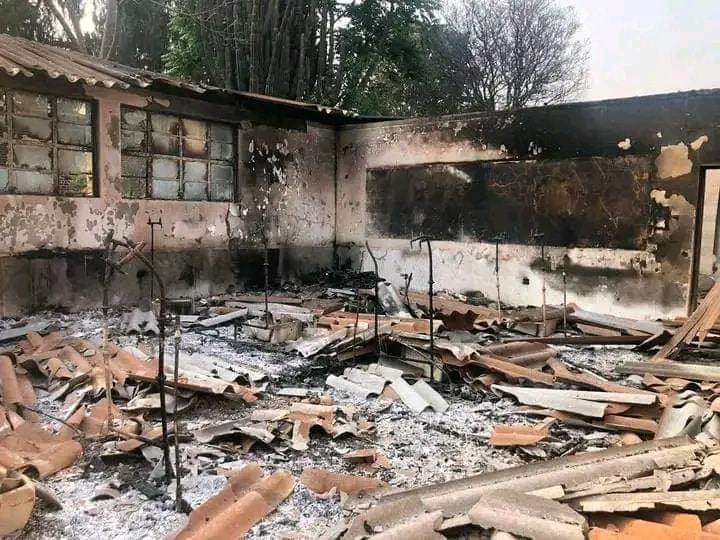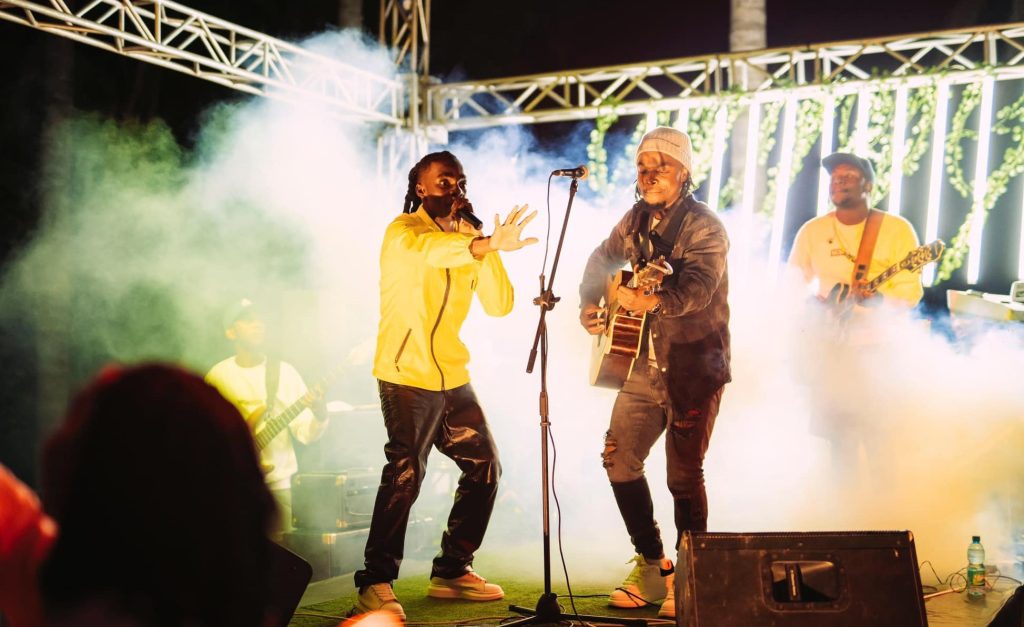Francis Kamwendo, 14, from Kalimanjira Village in Nkhotakota District is battling bitter memories of the wee hours of September 23 2023 when students torched Robert Blake Secondary School in Dowa District.
He recalls seeing his fellow students ganging up to set their school ablaze in protest against school management’s crackdown on students suspected of smoking Indian hemp, commonly known as chamba.
One of the damaged buildings at Robert Blake Secondary School
“What I didn’t know was that this mob mentality would have devastating effects on my education and future,” says the Form Two boy.
He rues bullies from senior classes for forcing their junior schoolmates to riot against teachers and the school management.
“Being juniors, we had to take them seriously or brace for severe beatings,” Francis recounts. “Form Four students violently banged our hostel doors, commanding us to wake up and participate in the riot against the expulsion of some chamba smokers.”
As the reluctant juniors jumped out of bed, school buildings and property went up in flames.
The smoke billowing from the pride of Kongwe Hill prompted management to call the police who arrested suspected ring-leaders.
The Ministry of Education temporarily closed the school, indiscriminately sending the students packing.
The bitter pill for Francis arrived a week later when he received a letter from the headteacher expelling all students, except the Form Ones.
He narrates: “As the expulsion came just months before Junior Certificate of Education examinations, my parents sent me to Chididi Community Day Secondary School in Nkhotakota. I felt bad to leave a coveted and well-resourced national boarding secondary school for a CDSS, where the shortage of basic teaching and learning materials hit me hard.”
Kicked out of the boarding school run by the Nkhoma Synod of the Church of Central African Presybyterian, Francis had to walk over 10 kilometres daily to get to a crowded classroom, where nearly a dozen of students shared a textbook and other learning materials. There was no laboratory at Chididi CDSS.
“Our teachers often arrived late because they also came from far. This has affected my performance and I might not do well in the examination,” Francis says.
His mother Grace Kamwendo is worried about the uncertainties wrecking the emotional well-being of her “good boy”.
“My son has become angry and aggressive towards his siblings,” she says. “Since he was expelled from Robert Blake, his class performance has dropped.”
Mariam Selemani, a 17-year-old Form Three student, ended up in an illicit marriage in October 2019 when Thyolo Secondary School was temporarily closed after students damaged some property.
She recalls: “My parents had already paid tuition in full, so they could not afford to send me to another school since they also had to take care of my four siblings.
“As I was waiting for my school to reopen, I fell pregnant and got married. My dream of becoming a nurse was ruined.”
Such anecdotes personify the impact of school vandalism on learners, including innocent ones.
Since March last year, students across the country have damaged eight schools, eroding the country’s strides to provide enabling spaces for quality teaching and learning.
Other affected schools include Kamwanya CDSS in Mchinji, Nkhata Bay Boys Secondary School, Malosa Secondary School in Zomba, Matandani Secondary School in Thyolo, Balaka Secondary School and Nachitheme and Kholo secondary schools in Ntcheu.
The 2022 Multiple Indicator Cluster Survey by Unicef shows that 85 percent of students in the country do not complete senior secondary school due to various factors, including violence.
Ministry of Education spokesperson Mphatso Nkuonera says the government is reviewing school rules and regulations to instil discipline in students, including ending vandalism.
“When this policy is reviewed, it will put to rest such misconducts. If found on the wrong side of the rules, students will be banned from attending any public school in the country,” he says.
According to Nkuonera, the ministry also conducts joint counselling meetings with parent-teacher associations and faith leaders surrounding schools to sensitise students to the dangers of instigating violence.
“[The community change agents], also engage learners to be patriotic and responsible citizens who will initiate dialogue when misunderstandings arise,” he states.
But educationist Steve Sharra says the first step to end school vandalism is understanding the root cause.
“Most of the time, students complain about degrading living conditions such as poor hygiene, food and recreation activities. Government should consider investing more funds in schools for easy management,” he says.
A study by Chikombe Tembo, an education researcher from Mzuzu University, recommends that the government regularly trains school managers on how to effectively handle adolescents and resolve conflicts.
Concurring, Private Schools Owners Association president Enerst Kaonga says engaging students in decision-making on all school affairs and instilling self-discipline would reduce the challenge.
“Keeping students busy with extracurricular activities is also an option since students will have little time for violence,” he said.
The post Vandalism ruined my schooling first appeared on The Nation Online.
The post Vandalism ruined my schooling appeared first on The Nation Online.
 Moni Malawi
Moni Malawi 

